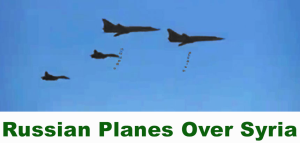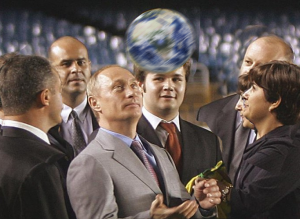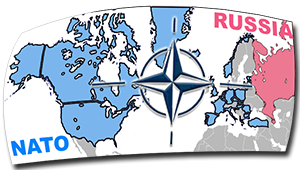 (Der Spiegel, abstracted) Remember the Cuban missile crisis? Syria is the Cuba of 2016 and the risk of an international confrontation there is growing by the day. … Moscow and NATO member state Turkey are squaring off in the Syrian conflict, and the potential consequences for the trans-Atlantic alliance are impossible to predict.
(Der Spiegel, abstracted) Remember the Cuban missile crisis? Syria is the Cuba of 2016 and the risk of an international confrontation there is growing by the day. … Moscow and NATO member state Turkey are squaring off in the Syrian conflict, and the potential consequences for the trans-Atlantic alliance are impossible to predict.
Russian President Vladimir Putin and Turkish President Recep Tayyip Erdogan both have few scruples when it comes to wielding power and the two have previously demonstrated that they are more than willing to use force against their own people in an emergency. Both have likewise experienced the frustration of failed rapprochement with the West. How rational are they? How far might they go?
The conflict intensified at the end of November when Turkey shot down a Russian warplane and now Putin has  forged an alliance with the Syrian Kurds, Erdogan’s archenemies. Turkey too has done its part in recent weeks to ratchet up the escalation. Turkish troops are now firing artillery across the border at Kurds in Syria and Ankara has also been thinking out loud about possibly sending ground troops into Syria to take on the Kurds.
forged an alliance with the Syrian Kurds, Erdogan’s archenemies. Turkey too has done its part in recent weeks to ratchet up the escalation. Turkish troops are now firing artillery across the border at Kurds in Syria and Ankara has also been thinking out loud about possibly sending ground troops into Syria to take on the Kurds.
The confrontation is also taking place against the backdrop of a personal feud between Putin and Erdogan. The two used to be friendly with one another, but sources in Moscow say that Putin felt deeply and personally betrayed by Erdogan following the shooting down of the Russian plane. Erdogan sought several times to personally apologize to Putin, but that wasn’t enough for the Russian president. He wants Erdogan to make a public display of contrition.
NATO Gets Nervous
 The decisive article, however, is Article 5, which guarantees that an “armed attack against one or more of (the alliance members) in Europe or North America shall be considered an attack against them all.” But Luxembourg’s Foreign Minister Asselborn notes that “the guarantee is only valid when a member state is clearly attacked.”
The decisive article, however, is Article 5, which guarantees that an “armed attack against one or more of (the alliance members) in Europe or North America shall be considered an attack against them all.” But Luxembourg’s Foreign Minister Asselborn notes that “the guarantee is only valid when a member state is clearly attacked.”
Ankara was already rebuked following the shooting down of the Russian warplane, with NATO diplomats speaking of a Turkish overreaction. “We have to avoid that situations, incidents, accidents spiral out of control,” warned NATO General Secretary Jens Stoltenberg.
Berlin agrees. “We are not going to pay the price for a war started by the Turks,” says a German diplomat. Because decisions taken by the North Atlantic Council, NATO’s primary decision-making body, must always be unanimous, it is enough for a single country to exercise its veto rights, the official says. But, the official adds, it won’t get that far: there is widespread agreement with the US and most other allies that Turkey would get the cold shoulder in such a case.
Nevertheless, NATO alliance members are monitoring the Turkish-Russian confrontation with concern. There is, after all, always the risk that Russia at some point might attack Turkish positions on Turkish soil. “Were the Russians to carry out a retaliatory strike against Turkey, we would have a problem,” says a NATO official. In such a case, Turkey could very well invoke Article 5. Were the North Atlantic Council to fail to achieve unanimity, Putin would once again have split the West, the official says.
Either way, the 28-member alliance is not of a single mind when it comes to Russia. The question as to how one should approach Putin’s aggression is a matter of significant debate. Moscow’s intervention in Syria has simply intensified that discussion.
On one side are those countries that once suffered under Russian hegemony: Poland, the Czech Republic and the three Baltic countries. They are in favor of a tough line against Moscow and have been building up their militaries on NATO’s eastern border with the help of the US as a deterrent to Putin.
A second group is more pro-Russian, primarily out of individual — mostly economic — interests. That group includes Bulgaria and Romania, but also Slovakia and Hungary. On Wednesday, for example, Hungarian Prime Minister Viktor Orbán demanded an end to European sanctions against Russia. The Greek government, under the leadership of Alexis Tsipras, also leans pro-Russia.
Refraining from Provoking Putin
And then there is the special case of Paris. France is openly flirting with Moscow, with French Prime Minister Manuel Valls demonstratively praising cooperation with Russia at the Munich Security Conference. “We welcome France’s constructive role,” said Russian Prime Minister Medvedev, returning the praise.
Germany leads the group of moderate critics of Russia, but it is a group to which most other Western European countries belong. They are critical of Russia’s geopolitical ambitions but are also wary of breaking off contact to Moscow. Berlin’s role here is key. The German government sharply criticized Putin’s actions in Crimea and eastern Ukraine, but has also urged that Russian concerns be taken seriously and has refrained from provoking Putin.
The dispute between the hawks and the doves within NATO primarily focuses on the arms build-up on NATO’s eastern border. At the beginning of February, the Pentagon announced that it would request €3.4 billion ($3.8 billion) for an expanded presence in Eastern Europe. The Americans plan to station equipment for an entire tank division in the region, including battle tanks, artillery and other heavy weaponry. In an emergency, a unit of 20,000 combat-ready troops from the US could quickly be deployed. In addition, a brigade is to be stationed in NATO’s east, rotating between bases.
Not coincidentally, Poland is planning a large maneuver together with the US ahead of the next NATO summit, to be held in Warsaw in July. The joint military exercise, named Anaconda, will involve 25,000 troops and 19 additional alliance members, but it is not an official NATO exercise. The Americans have pledged 90 tanks for the maneuver, which is to simulate a land invasion of Poland — a classic Article 5 scenario.
Germany isn’t particularly taken with such posturing. In the coming months, Berlin intends to do what it can to prevent the stationing of additional NATO troops or materiel in the alliance’s eastern member states. The German military is not prepared to send additional troops to the Baltic countries or to Poland.
For Berlin, it is important to avoid calling into question the 1997 Founding Act on Mutual Relations between Russia and NATO. According to that agreement, “additional permanent stationing of substantial combat forces” in the former Eastern Bloc is to be avoided. It is exactly this agreement, though, that new Polish Foreign Minister Witold Waszczykowski declared to be “invalid” at the Munich Security Conference. The security situation, he argued, has fundamentally changed and Russia terminated the agreement on its own by virtue of its actions in Crimea.
‘Masterful Tradecraft’
Moscow, for its part, reacted immediately to the US armaments plans. Andrey Kelin, the Russian Foreign Ministry official responsible for pan-European cooperation, announced that Russia would respond by stationing three new divisions, a tank army and 50 strategic, nuclear-compatible bombers on Russia’s western border. Moscow, he said, would also equip its Caspian and Black Sea fleets with cruise missiles of the kind Russia launched into Syria from a distance of over 1,000 kilometers on Putin’s birthday.
From the perspective of power politics, officials in Berlin and elsewhere are willing to concede, Putin’s intervention in Syria has thus far been a great success. “It is masterful tradecraft,” a close Merkel advisor says admiringly. Russia, he says, not only stabilized the regime of its ally Assad, but has also done everything in its power to make the situation more difficult for the West.
Chancellery officials believe that Putin is deliberately trying to trigger a new wave of refugees to further divide Europe. Furthermore, they believe that Putin would welcome a further evaporation of support for Merkel among the German electorate.
The chancellor has promised to solve the refugee crisis together with Turkey. The country is to ensure that refugees can no longer stream into Greece across the Aegean. But the more people escape the violence of Syria into Turkey, the less inclined Ankara is to tighten up its western border to Greece. Erdogan already has enough problems. Why should he expend even more effort to help Merkel?
The chancellor is doing her best to entice the Turkish government with pledges of money and an easing of visa requirements. But she now finds herself in the dilemma of being unable to offer Turkey assistance in its conflict with Russia even as she needs Ankara’s help. Knowing both Putin and Erdogan as she does, she is aware that neither is exactly a model of equanimity. She is extremely wary of encouraging Erdogan in any way to start something with Russia.
Using NATO to Pressure Turkey
That’s what makes the situation so complicated. Thus far, when addressing the need to tighten the maritime border in the Aegean, Turkey has talked a lot but done little. Which is why Merkel brought in NATO to patrol the border between Turkey and Greece. Officially, the alliance has been charged with providing surveillance and combatting migrant smugglers. In reality, though, the presence of the Standing NATO Maritime Group 2 is to increase pressure on Turkey by making it impossible for government officials to continue claiming they don’t know where on the coast the refugee boats were launching from.
With the German ship Bonnleading the way, the NATO fleet is to determine the starting points of refugee boats and the routes they take. The data will then be used to force the Turks to block off the launch points, say NATO officials. Ideally, the ships are to have real-time contact with Turkish coast guard vessels.
Moscow has realized just how touchy the game is that Merkel is playing. The German chancellor’s refugee policies have made her dependent on Erdogan, a man who has not traditionally been particularly concerned about human rights. Not that Putin himself much cares about human rights either. But the Kremlin is happy to take advantage of the situation for a small propaganda victory.
“Apparently, Merkel has suffered from a short-circuit in her brain,” wrote the pro-government tabloid Komsomolskaya Pravda a few days ago. “A lamb is flirting with the jackal. One would like to ask Merkel: Do you share Erdogan’s values? Are you happy about all of the journalists sitting in prison?”